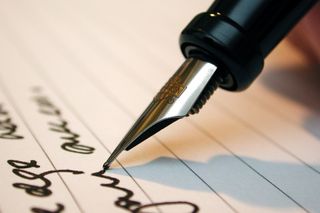Mindful meetings: can ditching laptops for pen and paper improve productivity?
Wacom research suggests most of us prefer pen and paper to laptops for meetings

Meetings are not productive, and tech isn't helping.
That's not a controversial statement to anyone who's ever had to sit through rambling co-workers and pointless PowerPoints while sat next to colleagues showing more interest in their Facebook feed than the topics at hand.
But a poll commissioned by Wacom offers some stats to better describe our meeting torment, finding that UK office workers spend as much as a fifth of their time in meetings, with 43% of those surveyed saying meeting attendees aren't "present and engaged". More than a third of respondents admitted to not concentrating during meetings or working on other tasks suggesting the other two thirds are liars while a fifth says they've even nodded off.
What can be done? The research suggests our meetings become more mindful taking in the trend of mindfulness, or actively focusing on the here and now in particular by banning laptops. The poll found 37% of respondents thought meetings would be "more efficient and engaging" if there was a "laptops down" rule, while two-thirds of British office workers says taking notes by hand was better than on gadgets.
Pen and paper notes
"A laptop can be good for taking notes, but it's not going to be long before Twitter and Facebook pop up," says Cathy White, founder of Geek Girl Meetups, presenting the research.
Not everyone is mindlessly scrolling their social feeds, of course. Some meeting attendees are multitasking or taking notes, but that means they aren't focused on the task at hand they aren't being "mindful". "To be really good, you need flow," says Wacom spokesperson for EMEA, Jeroen van't Hoofd. "We need to focus on what we're actually supposed to be doing."
"We've seen 62% still prefer doing notes with pen and paper," van't Hoofd says. "It's natural, it helps us to just jot down a couple of quick ideas, it's visual and intuitive, there isn't this awkward [search for] a format before you type."
Get the ITPro. daily newsletter
Receive our latest news, industry updates, featured resources and more. Sign up today to receive our FREE report on AI cyber crime & security - newly updated for 2024.
On paper, you can doodle, draw flow charts and pictures, circle key ideas all of that is difficult to capture on a laptop in Word. "You think differently than you would with a keyboard," he added, though he noted that on the downside, those papers can be lost or left out of digital workflows. The challenge is getting paper digitised.
Of course, the research being cited is a promotional survey sponsored by Wacom, which handily bridges the gap between paper notes and digital records with its pair of smart clipboards that digitise notes taken via pen and paper called the Bamboo Folio and Bamboo Slate.
Wacom isn't the only tech maker that has its eye on making digital notetaking less painful and as a journalist who takes a lot of notes, it's appreciated. That includes the Livescribe smartpens that capture your handwritten notes digitally in the app, with Moleskine notebooks designed specifically to support the system. There's also Remarkable, a crowdfunded tablet with a "paper-like" display that captures your sketches and notes. And there's plenty of tablets and hybrid laptops that support a stylus, but the Lenovo Yoga Book takes it a step further, trading a standard keyboard for virtual one on a surface that can also be used for note-taking. If you prefer paper, you can use a magnetic clip that comes with the Yoga Book to fasten any notebook to the device, capturing any notes or drawings you make on the paper.
While manufacturers clearly think there's demand for a smarter way to scribble notes, for a less biased take, we asked academics researching mindfulness and note-taking.




